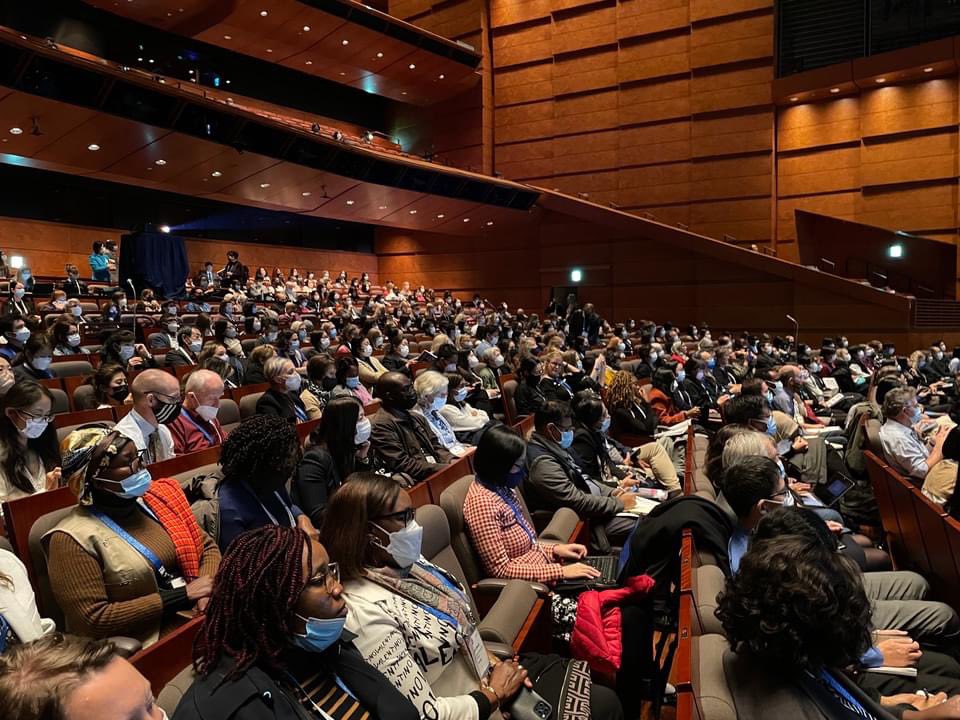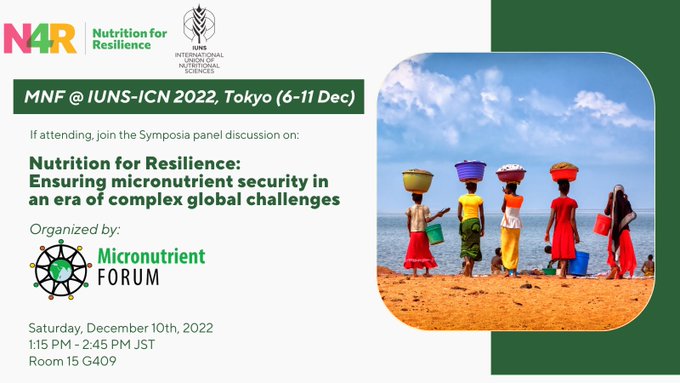6-11 December 2022. 22nd International Congress of Nutrition of the International Union of Nutrition Sciences (IUNS-ICN).
Every four years, since 1946, the IUNS organises the International Union of Nutritional Sciences International Congress of Nutrition (IUNS-ICN). The aim of each IUNS-ICN is to promote the exchange of knowledge in Nutritional Sciences.
The scientific programme is comprised of plenary lectures, keynote lectures, parallel symposia, sponsored symposia, and satellite symposia. The Congresses are attended by 3-4000 participants from all over the world. Recent locations include Buenos Aires, Argentina; Granada, Spain; and Bangkok, Thailand, to name just a few.
- GAIN Speaker: Lawrence Haddad, Executive Director, GAIN
This event brought together leading young advocates, scientists and thought leaders to discuss the implications of the Lancet Series on Adolescent Nutrition, and the multi-sectoral actions required to enable effective policy and programmatic responses for sustainable food environments.
Front-of-package labels (FOPLs) are a promising population-level strategy to inform consumers and discourage unhealthy food purchases, but little research has examined their impact in adolescent populations.Fortification of wheat and nixtamalized maize flour has been mandated in Mexico since the early 2000s, but micronutrient deficiency remains high.
7/12 Nourishing the future: the role of fish and fishery products for improved food and nutrition.
The nutrient density of fish and aquatic foods surpass that of staple grains and tubers, fruits and vegetables.
The nutrient density of fish and aquatic foods surpass that of staple grains and tubers, fruits and vegetables.
7/12 Designing and assessing food affordability: A wealth of approaches
Affordability is a major barrier to consumption of nutritious foods and numerous methods exist for its analysis, but there is little guidance on when to use which method.
Affordability is a major barrier to consumption of nutritious foods and numerous methods exist for its analysis, but there is little guidance on when to use which method.
7/12 Revealing the prevalence of "hidden hunger": global and regional estimates of micronutrient deficiencies among preschool-age children and non-pregnant women of reproductive age
This session, discussed research undertaken to estimate the current global prevalence of deficiency, with a focus on women and children in low- and middle-income countries. Micronutrient deficiencies compromise immune systems, hinder child growth and development, and limit human capital worldwide.
This session, discussed research undertaken to estimate the current global prevalence of deficiency, with a focus on women and children in low- and middle-income countries. Micronutrient deficiencies compromise immune systems, hinder child growth and development, and limit human capital worldwide.
7/12 The Future of Processed Foods
This session discussed different views on processed foods, including a member of the World Business Council for Sustainable Development and perspectives from academia, civil society, and policymakers.
This session discussed different views on processed foods, including a member of the World Business Council for Sustainable Development and perspectives from academia, civil society, and policymakers.
7/12 Availability of global adolescent’s dietary intake data: A scoping review
Dietary intake during adolescence is of crucial importance to nutrition, growth, and future health outcomes. This session discussed a scoping review conducted to assess the quality of adolescent diets across the world and identify gaps in the data.
Dietary intake during adolescence is of crucial importance to nutrition, growth, and future health outcomes. This session discussed a scoping review conducted to assess the quality of adolescent diets across the world and identify gaps in the data.
7/12 New Metrics and Assessment Tools to Support Innovative Financing of Nutritious Foods
Small- and medium-enterprises (SMEs) could be key to expanding access to nutritious foods in low- and middle-income countries and can be supported financially through impact investment. This session reviewed available metrics used in impact investment and considers their feasibility and applicability to practical application by non-specialists in low-income settings.
Small- and medium-enterprises (SMEs) could be key to expanding access to nutritious foods in low- and middle-income countries and can be supported financially through impact investment. This session reviewed available metrics used in impact investment and considers their feasibility and applicability to practical application by non-specialists in low-income settings.
- Integrated programming reduces malnutrition, builds strong families, and reinforces social cohesion in Mali
- Impact of Enhanced Community Conversations to improve nutrition practices in Ethiopia
- Cost and affordability of a healthy diet: Global analyses of food prices for nutrition
- Understanding expenditure patterns and choices in low-income households PDF Download
- Applying tools for estimating lowest-cost nutrient-adequate and healthy diets for the design of food assistance and social protection transfers - PDF Download
- Promoting Healthier Diets: A Practical Fiscal Policy Framework
09/12 New Tools and Data for Global Diet Quality Monitoring
- By : IUNS task Force on Traditional and Indigenous Food Systems and Nutrition
There is increasing agreement in low- and middle-income countries that to address micronutrient malnutrition and the growing obesity burden, countries need to invest in creating demand for healthy diets. This session covered cognitive, emotional and situational factors which affect demand for nutritious food, the ability of an intervention to change them, and programmatic applications of these findings.
11/12 Advancing adolescent nutrition - progress and learnings from adolescent-led experiences from
the field
Adolescents are the next entrepreneurs, taste makers, innovators and change agents; not just program recipients. Action is urgently needed to understand the perspectives of adolescents and engage them in designing programs and services that provide them with resources they need to well-nourished and healthy.
11/12 Using the Global Fortification Data Exchange (GFDx) to Review Presence of Documentation for Mandatory Large Scale Food Fortification Legislation, Standards, and Monitoring









No comments:
Post a Comment